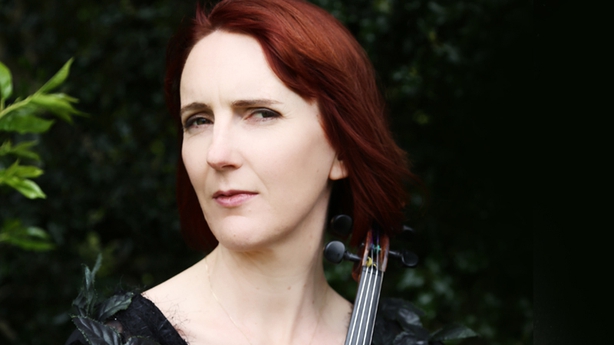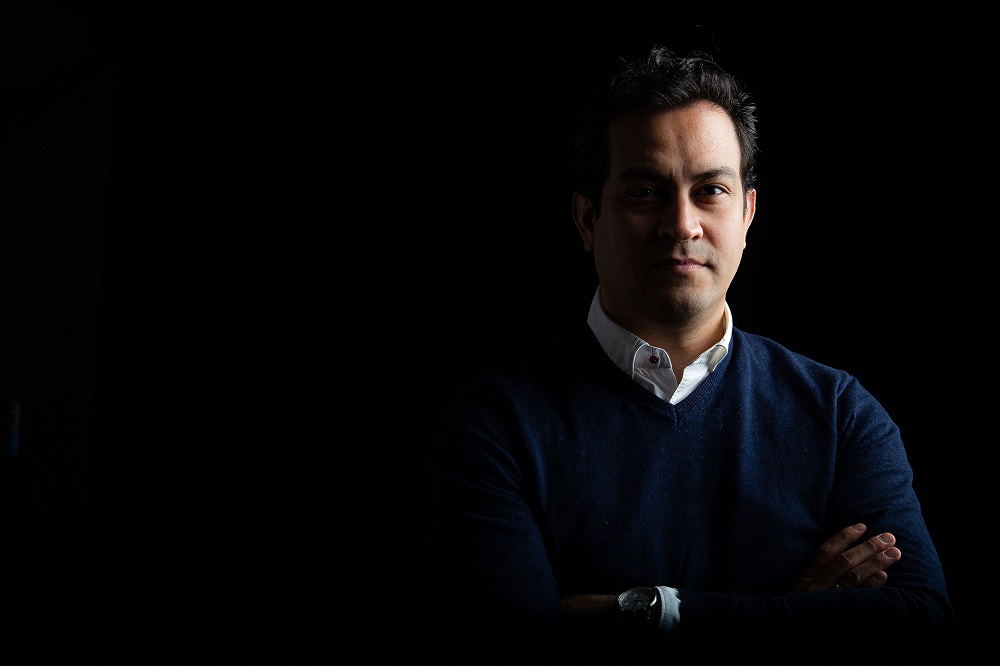Skride, National Symphony Orchestra, Matheuz, National Concert Hall, Dublin - musical philosophies soar | reviews, news & interviews
Skride, National Symphony Orchestra, Matheuz, National Concert Hall, Dublin - musical philosophies soar
Skride, National Symphony Orchestra, Matheuz, National Concert Hall, Dublin - musical philosophies soar
Collegial soloist, focused conductor and inspired orchestra ignite Bernstein and Strauss

Promising on paper, dazzling in practice: with a superlative soloist and conductor, this programme just soared on wings of philosophy-into-music. The spotlighting of NSO co-leader Elaine Clark provided another thread, from the opening chant of Linda Buckley‘s Fall Approaches through the keen dialogues with collegial Baiba Skride in Bernstein’s dazzling Serenade to the Viennese-waltz Dance Song of Strauss’s Also sprach Zarathustra.
Clark's fellow strings joined her – the violinist pictured below – in a flight brilliantly marshalled and focused by Diego Matheuz, due to conduct next Friday's Beethoven programme and replacing the National Symphony Orchestra's indisposed Chief Conductor Jaime Martín. One day I'll get to hear the orchestra and its transformer together, but this was no second best: Matheuz, a graduate like Gustavo Dudamel of Venezuela's El Sistema, is world-class (he's conducting Carmen at the Met this season). Richard Strauss's poetical response to Nietzsche's Thus Spake Zarathustra has been a regular on concert programmes recently – I had to miss Pappano's take on it with the LSO last week, though I did witness the National Youth Orchestra, the LPO and the Philharmonia play it of late, and this took the crown of the ones I heard.  Living with Strauss is a strange thing: sometimes he leaves me cold, as if all that orchestral virtuosity lives only on the surface; at others I'm lost in amazement at the depths and strangeness of his invention, as was the case with this Zarathustra.. Which is surely the strangest of all the symphonic poems; no wonder Bartók turned back to composing after hearing its Budapest premiere. Even the familiar was extraordinary on Friday night: how well graded the threefold trumpet invocation of the sunrise after the novel rumbling from the hall's fine organ and double basses, how shattering the climax (the National Concert Hall acoustics seem excellent to me, never harsh in the many loud climaxes, especially good for the prominent strings in the first half with resonant bass lines). Too many conductors, Strauss himself included, rush a lot of the incandescence, but Matheuz allowed space for the burgeoning string hymn, pauses for breath in a magnificent "Joys and Passions" sequence, airy ecstasy when the violins finally cut loose from the 12-note fugue depicting the mechanisms of science and fly into the stratosphere. This was an orchestra on world-class form.
Living with Strauss is a strange thing: sometimes he leaves me cold, as if all that orchestral virtuosity lives only on the surface; at others I'm lost in amazement at the depths and strangeness of his invention, as was the case with this Zarathustra.. Which is surely the strangest of all the symphonic poems; no wonder Bartók turned back to composing after hearing its Budapest premiere. Even the familiar was extraordinary on Friday night: how well graded the threefold trumpet invocation of the sunrise after the novel rumbling from the hall's fine organ and double basses, how shattering the climax (the National Concert Hall acoustics seem excellent to me, never harsh in the many loud climaxes, especially good for the prominent strings in the first half with resonant bass lines). Too many conductors, Strauss himself included, rush a lot of the incandescence, but Matheuz allowed space for the burgeoning string hymn, pauses for breath in a magnificent "Joys and Passions" sequence, airy ecstasy when the violins finally cut loose from the 12-note fugue depicting the mechanisms of science and fly into the stratosphere. This was an orchestra on world-class form.
An attentive audience of all ages, with plenty of students taking advantage of special offers, allowed Matheuz (pictured below) to hold on to the long pause after the thunderous centrepoint, and then we were off into ecstatic human realms, led by Clark and the multi-divided strings, but warmly lined by the brass. The final lullaby, B major heights challenged by C major nature, was more magical than I've ever heard it.  So we returned to silence, out of which the first notes of Buckley's Icelandic-inspired chant began the concert on solo violin (Clark's). This is a string piece adapted from the original for choir and electronics (I'd love to hear that, since the poem is so striking in its ambivalent approach to coming winter darkness). Rhythmic kicks to single notes keep the minimalism from sleepiness, and the world wakes up to wonder at the light from above just before the end.
So we returned to silence, out of which the first notes of Buckley's Icelandic-inspired chant began the concert on solo violin (Clark's). This is a string piece adapted from the original for choir and electronics (I'd love to hear that, since the poem is so striking in its ambivalent approach to coming winter darkness). Rhythmic kicks to single notes keep the minimalism from sleepiness, and the world wakes up to wonder at the light from above just before the end.
You could call this the philosophy of the ancients, but that was more literally the provenance of the talkers in Plato's Symposium, joining hands with second-half Nietzsche. Bernstein's only violin concerto is a masterpiece, and would be much more often played if named as such. But Serenade is fair in its distribution of ideas between soloist, fellow strings and percussion; here the most moving stretch was the ensemble build in the wondrous Adagio for Agathon before cadenza-like writing for the violin.
There is profundity here and at the start of the finale, but Baiba Skride showed the fun, too, making the helter-skelter fugue-scherzo depicting Eryximachus seem effortless. Everything is here – Stravinsky in the second movement, Britten in some of the later stages – but like all geniuses, Bernstein stamps his own identity on material that metamorphoses throughout the piece, in a songfulness hardly light years away from West Side Story. Which, it should be noted, takes its final irreconcilable clash of "Somewhere" keys as Maria grieves over Tony from the end of Also sprach Zarathustra. Only connect – and this concert did, superbly.
The future of Arts Journalism
You can stop theartsdesk.com closing!
We urgently need financing to survive. Our fundraising drive has thus far raised £49,000 but we need to reach £100,000 or we will be forced to close. Please contribute here: https://gofund.me/c3f6033d
And if you can forward this information to anyone who might assist, we’d be grateful.

Subscribe to theartsdesk.com
Thank you for continuing to read our work on theartsdesk.com. For unlimited access to every article in its entirety, including our archive of more than 15,000 pieces, we're asking for £5 per month or £40 per year. We feel it's a very good deal, and hope you do too.
To take a subscription now simply click here.
And if you're looking for that extra gift for a friend or family member, why not treat them to a theartsdesk.com gift subscription?
more Classical music
 Kaploukhii, Greenwich Chamber Orchestra, Cutts, St James's Piccadilly review - promising young pianist
A robust and assertive Beethoven concerto suggests a player to follow
Kaploukhii, Greenwich Chamber Orchestra, Cutts, St James's Piccadilly review - promising young pianist
A robust and assertive Beethoven concerto suggests a player to follow
 Robin Holloway: Music's Odyssey review - lessons in composition
Broad and idiosyncratic survey of classical music is insightful but slightly indigestible
Robin Holloway: Music's Odyssey review - lessons in composition
Broad and idiosyncratic survey of classical music is insightful but slightly indigestible
 Classical CDs: Wolf-pelts, clowns and social realism
British ballet scores, 19th century cello works and contemporary piano etudes
Classical CDs: Wolf-pelts, clowns and social realism
British ballet scores, 19th century cello works and contemporary piano etudes
 Bizet in 150th anniversary year: rich and rare French offerings from Palazzetto Bru Zane
Specialists in French romantic music unveil a treasure trove both live and on disc
Bizet in 150th anniversary year: rich and rare French offerings from Palazzetto Bru Zane
Specialists in French romantic music unveil a treasure trove both live and on disc
 Scottish Chamber Orchestra, Ibragimova, Queen’s Hall, Edinburgh review - rarities, novelties and drumrolls
A pity the SCO didn't pick a better showcase for a shining guest artist
Scottish Chamber Orchestra, Ibragimova, Queen’s Hall, Edinburgh review - rarities, novelties and drumrolls
A pity the SCO didn't pick a better showcase for a shining guest artist
 Kilsby, Parkes, Sinfonia of London, Wilson, Barbican review - string things zing and sing in expert hands
British masterpieces for strings plus other-worldly tenor and horn - and a muscular rarity
Kilsby, Parkes, Sinfonia of London, Wilson, Barbican review - string things zing and sing in expert hands
British masterpieces for strings plus other-worldly tenor and horn - and a muscular rarity
 From Historical to Hip-Hop, Classically Black Music Festival, Kings Place review - a cluster of impressive stars for the future
From quasi-Mozartian elegance to the gritty humour of a kitchen inspection
From Historical to Hip-Hop, Classically Black Music Festival, Kings Place review - a cluster of impressive stars for the future
From quasi-Mozartian elegance to the gritty humour of a kitchen inspection
 Shibe, LSO, Adès, Barbican review - gaudy and glorious new music alongside serene Sibelius
Adès’s passion makes persuasive case for the music he loves, both new and old
Shibe, LSO, Adès, Barbican review - gaudy and glorious new music alongside serene Sibelius
Adès’s passion makes persuasive case for the music he loves, both new and old
 Anja Mittermüller, Richard Fu, Wigmore Hall review - a glorious hall debut
The Austrian mezzo shines - at the age of 22
Anja Mittermüller, Richard Fu, Wigmore Hall review - a glorious hall debut
The Austrian mezzo shines - at the age of 22
 First Person: clarinettist Oliver Pashley on the new horizons of The Hermes Experiment's latest album
Compositions by members of this unusual quartet feature for the first time
First Person: clarinettist Oliver Pashley on the new horizons of The Hermes Experiment's latest album
Compositions by members of this unusual quartet feature for the first time
 Gesualdo Passione, Les Arts Florissants, Amala Dior Company, Barbican review - inspired collaboration excavates the music's humanity
At times it was like watching an anarchic religious procession
Gesualdo Passione, Les Arts Florissants, Amala Dior Company, Barbican review - inspired collaboration excavates the music's humanity
At times it was like watching an anarchic religious procession

Add comment